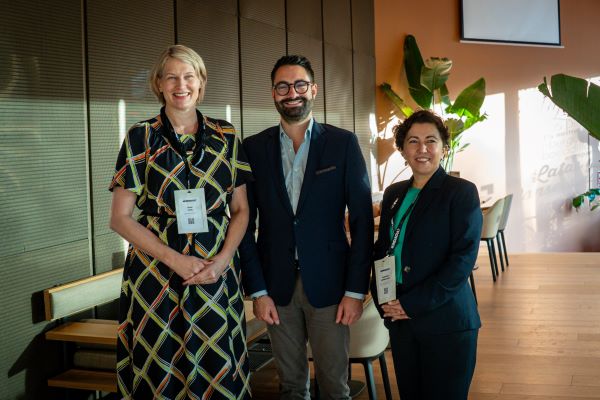 (L-R) Kajsa Ravin, President of IFACCA and Director of Arts Council Sweden; Eric Thill, Luxembourg’s Minister for Culture; Magdalena Moreno Mujica, Executive Director of IFACCA;
Credit: MCULT
(L-R) Kajsa Ravin, President of IFACCA and Director of Arts Council Sweden; Eric Thill, Luxembourg’s Minister for Culture; Magdalena Moreno Mujica, Executive Director of IFACCA;
Credit: MCULT
On Monday 29 September 2025, Luxembourg’s Minister for Culture, Eric Thill, represented the Grand Duchy at the United Nations Educational, Scientific and Cultural Organization (UNESCO) World Conference on Cultural Policies and Sustainable Development, MONDIACULT 2025, in Barcelona.
Organised jointly by UNESCO and the Spanish government, the conference brought together more than 150 ministerial delegations to strengthen international cooperation and define a common vision for the future of culture.
According to the Ministry of Culture, in a context marked by digital transformation and artificial intelligence (AI) in the cultural sector, Luxembourg advocated for responsible, ethical and responsible and people-focused use of technology. Speaking in thematic sessions on these issues, Minister Thill stated that “artificial intelligence must serve humanity - not replace it. It can only become a driver of cultural enrichment if it is guided by strong ethical principles, serving artists, professionals and the public.”
The minister presented Luxembourg’s national initiative on AI in culture, part of the government’s digital strategy adopted in May 2025. The project aims to improve discoverability and access to works while protecting copyright, with human creativity remaining central to international policies.
On the sidelines of the conference, Minister Thill met with Ernesto Ottone, UNESCO Assistant Director-General for Culture, to whom he presented a Luxembourgish edition of the illustrated children’s book Wat mécht eis zum Mënsch? (What Makes Us Human?), symbolising Luxembourg’s commitment to linguistic diversity and cultural education. This translation, issued on the occasion of the first Luxembourgish Language Day, celebrated on 26 September, is the 45th language version of the book. According to the ministry, it illustrates Luxembourg’s commitment to linguistic diversity and cultural transmission.
The Culture Minister also met with representatives of International Federation of Arts Councils and Culture Agencies (IFACCA) to discuss international cooperation on technological issues in culture.
The following day, he met Luxembourg artists based in Catalonia, including Julie Costentin, Francesco Tristano Schlimé and Justine Lotus, underlining both their contribution to Europe’s cultural vitality and the importance of maintaining close ties with talents abroad.
EO








